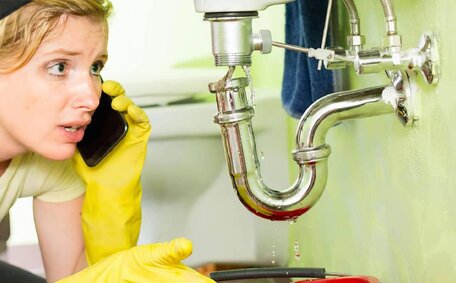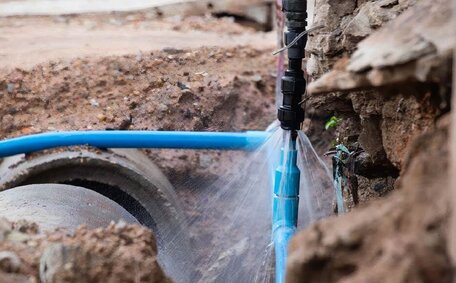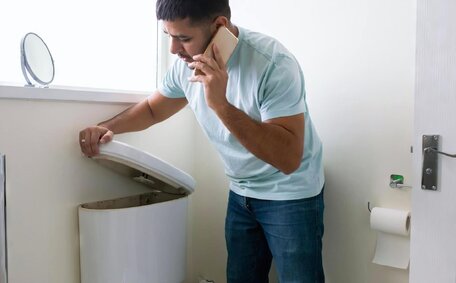Understanding Pipe Relining and Its Key Benefits
Pipe relining revitalises old, damaged pipes, avoiding traditional excavation and pipe replacement. This process could markedly improve your plumbing system by inserting a flexible epoxy resin lining into broken pipes, which then hardens to form a smooth, watertight seal. Pipe relining revitalises old, damaged pipes, avoiding traditional excavation and pipe replacement.
The substantial benefits of pipe relining encompass:
- Minimal disruption - Accesses pipes using small entry points, avoiding major excavation work
- Strengthened pipe integrity - The epoxy resin establishes a robust barrier, enhancing pipe lining against future fissures, seepages, and invasions from tree root incursions
- Secure pipe connections after relining - Halting root intrusions and infiltration effectively
- Longevity - With no requirement for the traditional dig method, relined pipes can last between 30-50 years on average
- Cost-effectiveness - Eliminates the need to completely replace damaged pipes with new ones, therefore being more cost-effective than excavation methods
Renewing pipes from the inside significantly extends their operational lifespan with pipe relining being a superior choice. When evaluating your choices, pipe relining could be your best path for a swift, non-invasive, and financially prudent remedy.
Exploring various pipe relining methods and their benefits demonstrates its advantages over traditional techniques. Keep reading as we analyse the costs over time to demonstrate the value.
How Pipe Relining Works
The pipe relining process is a multi-faceted approach that renews pipes from the inside out. There are two principal methods of pipe relining - Patch relining and the Inversion method.
Patch Pipe Relining
One method of pipe relining, known as patch relining, targets isolated areas for effective damage control. It involves:
- Cleaning the pipe drain - High-pressure water jets are employed to clear blocked drains of rust, roots and debris.
- Conducting a meticulous inspection with a CCTV drain camera, understanding the issue before confirming the price of the appropriate solution
- Small, precise cuts may be needed to create access points in damaged regions.
- Blowing air to dry the pipe walls
- Coating cracks and holes with epoxy resin
- A resin-soaked felt patch tube is then inserted into the area requiring attention using meticulous techniques
- The patch is inflated with air pressure until it hardens in place.
Patch lining effectively remedies minor leaks or cracks in your existing pipes. As it seals targeted spots, it works well for small repairs.
Inversion Pipe Relining
Inversion relining entirely renews larger sections, allowing for a damaged pipe to replace the compromised area with a sturdy, new interior. The process includes:
- High-pressure water cleaning of the sewer line
- CCTV inspection to gauge the pipe condition
- Cutting access points at each end of the pipe section
- Blowing air to dry the pipe walls
- Saturating a felt resin liner with the epoxy resin we use
- The liner is inverted into the pipe via an inversion drum with controlled air pressure.
- Hot water is introduced to cure and solidify the liner, ensuring the resin sets perfectly.
Inversion pipe relining is ideal for comprehensively renewing extended sections of your pipeline. As it forms a new pipe within your existing pipeline, it’s a methodology endorsed by our plumbing team for its lengthy service life.
We tailor our pipe relining recommendations to suit each unique job, providing detailed advice before commencing work.
Comparing Costs: Pipe Relining vs Full Replacement
When sizing up your options for plumbing solutions, the upfront cost is often a primary concern. Initial cost comparisons show pipe relining to be 10-30% more affordable than complete pipe replacement.
Nevertheless, a long-term cost analysis reveals considerable savings with pipe relining. Given its 50-year life expectancy, the ongoing cost savings with pipe relining are considerable. Full pipe replacement may initially appear less costly but can lead to a more expensive repair scenario over time.
Key Pipe Relining Cost Considerations
- Landscaping restoration is unnecessary, as the process only requires neatly drilled holes instead of large trenches
- Quicker completion times - Pipe relining jobs often finish in 1-2 days, in contrast to the 1-2 weeks required for traditional methods
- Future longevity - Largely avoids the necessity for further pipe repairs for 30-50 years
Variables That Influence Price
The exact cost pipe relining involves depends on factors like:
- Pipe material, length and diameter
- Location accessibility
- Extent of damage
- Relining method used - Patch repairs or full inversion
On average, pipe relining costs typically range from $85 to $170 per metre. Thus, relining a 20-metre section of pipe would typically cost between $1,700 - $3,400*.
In comparison, traditional replacement of the same 20-metre section could incur costs ranging from $5,500 to $20,000*.
Considering the long term, pipe relining yields significant savings by mitigating future repairs and the mess from traditional methods.
Factors Influencing Pipe Relining Costs
Pipe Material and Diameter
The material and length of your pipes are significant factors affecting the total cost. Additionally, the pipe’s diameter determines the amount of lining material required. As a general rule of thumb:
After relining PVC pipes and their counterparts such as clay, concrete, and Orangeburg fibre, different degrees of cleaning effort are warranted prior to the procedure.
- Relining PVC and copper pipes generally incurs the lowest cost.
- Clay, concrete and Orangeburg piping costs 10-15% more on average
- Wider pipes 150mm+ diameter add 20-30% to the project cost
Accessibility and Project Complexity
The challenges faced by our team physical access to pipe entry points invariably affect the overall expenditure. Simple, direct pipe layouts with clear access points at either end range from $85 - $120 per linear metre*. But intricate pipe configurations with multiple bends, junctions and tricky access can add 50-100% onto the price.
If asbestos cement pipes need removal before relining, this hazardous material handling also increases costs. Similarly if extensive root or rust removal is needed, more preparatory work adds expenses.
Labour, Equipment and Materials
The project timeframe also influences the total pipe relining cost. Projects spanning 20-30 metres and completed in 1-2 days average between $4,000 and $7,500. Lengthier 50m+ projects, taking 3-5 days, can exceed $10,000.
The contractor’s business expenses like labour, equipment fees and material costs ultimately get factored into your quote. Therefore, it’s worthwhile to compare companies based on their crew’s experience, machinery quality, and material standards.
Northmead Plumbing ensures complete transparency, offering you peace of mind with your plumbing investments. With our dedication to quality and strong industry reputation, we provide top-tier pipe relining solutions, scrutinised meticulously before commencing any work.
Indicative Pricing for Pipe Relining Services
When requesting quotes for pipe relining services in the Northmead area, indicative pricing starts from:
- $85 - $120 per linear metre for simple PVC or copper pipe relining projects
- $130 - $180 per linear metre for concrete, clay or Orangeburg pipe relining
- $150 - $250+ per linear metre for difficult access locations or complex configurations
Remember, the final cost is contingent upon the unique specifics of your project. Factors like pipe diameter, material, total length being relined and job location complexity can all impact the overall costs.
For accurate quotes from a pipe relining specialist that cater to the particular needs of your home, connect with Northmead Plumbing today. Call 1300 349 338 or email jobs@northmeadplumbingservices.com.au. Our qualified technicians will inspect your pipes and provide transparent pricing with no hidden fees.
The Long-Term Value of Pipe Relining
When weighing up your options regarding plumbing solutions, it’s critical to consider the long-term costs and benefits. Could your plumbing system benefit from pipe relining? It offers substantial value over time when compared to traditional pipe replacement.
Long-Term Cost Savings
While relining may incur a marginally higher initial outlay, it could be your greatest asset over the ensuing decade or two. By renewing your plumbing from the inside out, relining sidesteps the frequent pipe repair needs down the track.
Epoxy-lined pipes typically last up to 50 years, substantially saving on maintenance and replacement costs. Pipe relining is a cost-effective investment that keeps money in your pocket long-term.
Property Value & Infrastructure Integrity
Pipe relining maintains your property’s value and preserves infrastructure integrity against further damage. It prevents leaks, bursting, flooding hazards from cracked pipes in walls and under floors.
This safeguards your building’s foundations and surfaces both inside and out. Pipe relining allows you to proactively tackle problems, helping you make sure to bypass costly property repairs.
Environmental Advantages
Pipe relining is environmentally favourable, with smaller access points reducing soil and landscape disturbance. The small-scale work goes along way in reducing disruption to gardens, trees, and vegetation.
Thus, when comparing plumbing solutions, consider more than just the immediate cost. View pipe relining as a wise long-term investment in your property’s functionality and future value.
Choosing a Qualified Pipe Relining Company
When selecting a professional to handle your pipe relining project, it pays to do thorough research. A reputable, experienced company is key to achieving quality results from the relining process, ensuring long-lasting value.
Essential Credentials to Consider:
- Industry experience - Companies with a solid track record and at least 5 years serving your local area
- Formal qualifications - Licenced, insured and accredited technicians
- Quality equipment - Using professional-grade machinery and materials
- Strong reputation - Positive customer reviews and testimonials
Northmead Plumbing fulfils these standards, guaranteeing dependable pipe relining for Sydney’s inner west residents:
- Over a decade of licensed plumbing expertise in the Northmead community
- Fully certified and insured for safety and compliance
- Latest relining machinery with high-grade epoxy resins
- 5-star reputation for skill, efficiency and service
Trust Northmead Plumbing for cost-effective pipe relining that endures over time. Give us call on 1300 349 338 or email jobs@northmeadplumbingservices.com.au to discuss your needs.






